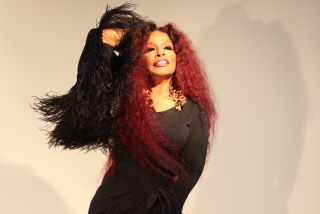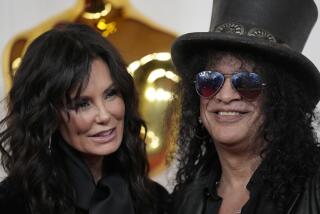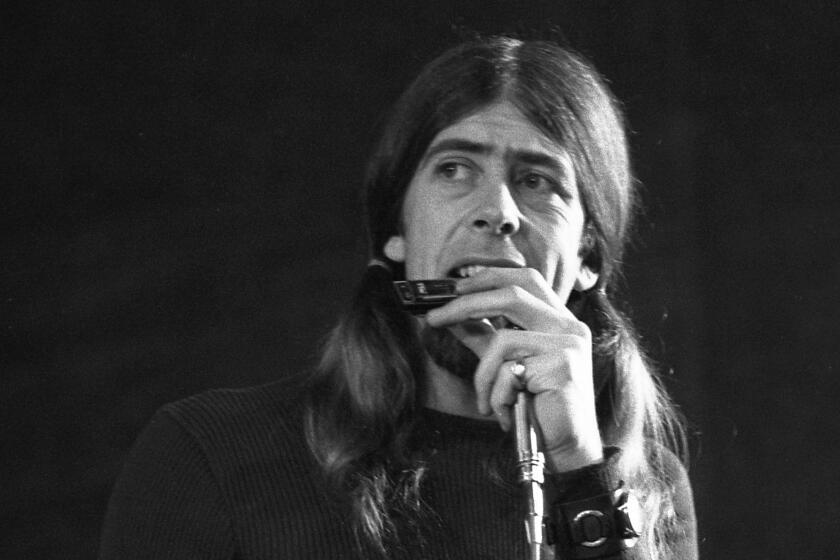Korn: Emptiness Behind the Fury
This week’s column reviews the CD debut of Korn. This local band sows in anger as it seeks to harvest the burgeoning audience of mosh-pit denizens who seek catharsis in get-it-off-your-chest rants set to jackhammer beats. Ratings range from * (poor) to **** (excellent). Three stars denote a solid recommendation.
** Korn, “Korn” Immortal/Epic Mick Jagger sees a red door and he wants it painted black. All the exits from Korn’s insulated nightmare universe already have been painted over and sealed up, leaving the Huntington Beach foursome to slam its collective head repeatedly against doors it can’t even see. The process gets Korn almost nowhere, and it must really smart.
If you accept the aesthetics of the thrashing, metallic, incessantly wrathful rock style that Korn plays, this debut is a smashing success. The idea is indeed to keep banging until it hurts, and to channel the rage born of inner pain and frustration into the music.
Kindred to such bands as Tool, Rollins Band and Rage Against the Machine, Korn and its singer-lyricist, Jonathan Davis, make their core ethic fairly explicit in songs like “Predictable,” “Lies” and “Fake”: the world is a torment-filled morass that leaves us seething with deep, internalized fears; virtue lies in confronting those painful truths unflinchingly and screaming them to the world.
Yes, there is a kernel of merit in that approach, but it has more to do with psychotherapy than art.
Korn’s high-impact delivery of its rage-rock may provide a helpful, cathartic experience for listeners who can identify with the scars Davis reveals. But music’s ability to be an emotional touchstone is by itself no sensible measure of its artistic merit.
Korn’s ability to connect with listeners through cathartic rage is exactly parallel to the process of identification that takes place in country music, when fans respond to some of the manipulative, superficial and cliched treacle that oozes out of the Nashville song mills. For all their flaws, some of the most obvious tear-jerkers by Billy Ray Cyrus or Tim McGraw nevertheless touch many listeners deeply and wind up getting played at weddings and funerals.
Korn and its brethren bands imply that the expression of darkness and pain is inherently more truthful than the expression of brighter emotions. I think such bands merely suffer from a failure, or at least a crippling narrowness, of vision.
Great art, rock included, can’t be monolithic. Capturing how it feels to be torn apart inside is part of the job, and Korn, in its overstated, operatic, ultra-obvious way, certainly accomplishes that. What’s missing is a vivid evocation of the ideal that has been corroded, of the paradise that has been lost. It’s that glimpse of the good, and the knowledge of the void left by its absence or its defeat, that tears us apart as witnesses to a work of art.
For a while, Korn’s methods hold interest. Davis mixes his madman ranting with passages of baleful, but more controlled semi-singing and with the taunting singsong refrains that crop up like mantras in several songs.
On the opening tracks, “Blind” and “Ball Tongue,” and on “Helmet in the Bush,” such elements as the low hissing of white noise and the scraping of jagged guitars in the margins and corners of the recording’s stereophonic space convey a vivid, tensely claustrophobic feeling similar to the one that envelops a listener on “The Downward Spiral” by Nine Inch Nails. As the album goes on, Korn’s blasting and hammering become more head-on, the results less distinctive.
Davis plays with fire and gets burned on one number in which his repeated screaming of the song’s titular anti-gay epithet could well offer comfort to haters who want to turn the song to their own purposes.
A close listening, and the album’s overall context, make it clear that he isn’t lashing out overtly at homosexuals, but trying to recapture how he felt as a teen-aged misfit being humiliated by taunting bullies who flung sexual aspersions.
But if Bruce Springsteen couldn’t get a contextually aware listening (at least in some quarters) for “Born in the U.S.A.,” it’s doubtful Davis will here. Unfortunately, a member of Korn casually and disparagingly uses the same epithet in a snippet of studio-byplay that precedes the song “Clown.” Good luck conjuring a social-realism explanation for that one.
In the closing epic, “Daddy,” Davis goes through self-administered primal-scream therapy, recalling horrific childhood abuse before collapsing in hysterics, then quiet sobbing. Cathartic indeed, and also a very pat explanation for all the rage that has preceded it.
Let’s hope Korn has succeeded in purging itself with its first album. Maybe then it can find some subtler, more artful means with which to channel its undeniable intensity.
* Korn plays Friday at Club 369, 1641 N. Placentia Ave., Fullerton. 8 p.m. (714) 572-1816.
More to Read
The biggest entertainment stories
Get our big stories about Hollywood, film, television, music, arts, culture and more right in your inbox as soon as they publish.
You may occasionally receive promotional content from the Los Angeles Times.







